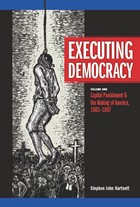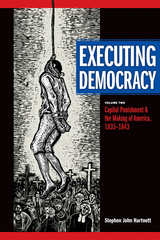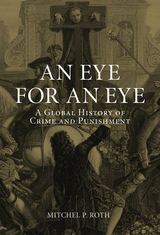4 start with E start with E


Executing Democracy: Capital Punishment & the Making of America, 1683-1807 is the first volume of a rhetorical history of public debates about crime, violence, and capital punishment in America. This examination begins in 1683, when William Penn first struggled to govern the rowdy indentured servants of Philadelphia, and continues up until 1807, when the Federalists sought to impose law-and-order upon the New Republic.
This volume offers a lively historical overview of how crime, violence, and capital punishment influenced the settling of the New World, the American Revolution, and the frantic post-war political scrambling to establish norms that would govern the new republic.
By presenting a macro-historical overview, and by filling the arguments with voices from different political camps and communicative genres, Hartnett provides readers with fresh perspectives for understanding the centrality of public debates about capital punishment to the history of American democracy.

This eye-opening and well-researched companion to the first volume of Executing Democracy enters the death-penalty discussion during the debates of 1835 and 1843, when pro-death penalty Calvinist minister George Barrell Cheever faced off against abolitionist magazine editor John O’Sullivan. In contrast to the macro-historical overview presented in volume 1, volume 2 provides micro-historical case studies, using these debates as springboards into the discussion of the death penalty in America at large. Incorporating a wide range of sources, including political poems, newspaper editorials, and warring manifestos, this second volume highlights a variety of perspectives, thus demonstrating the centrality of public debates about crime, violence, and punishment to the history of American democracy. Hartnett’s insightful assessment bears witness to a complex national discussion about the political, metaphysical, and cultural significance of the death penalty.

Drawing on anthropology, archaeology, folklore, and literature, Roth chronicles the global history of crime and punishment—from early civilizations to the outlawing of sex crimes and serial homicide to the development of organized crime and the threat today of global piracy. He explores the birth of the penitentiary and the practice of incarceration as well as the modern philosophy of rehabilitation, arguing that these are perhaps the most important advances in the effort to safeguard citizens from harm. Looking closely at the retributions societies have condoned, Roth also look at execution and its many forms, showing how stoning, hemlock, the firing squad, and lethal injection are considered either barbaric or justified across different cultures. Ultimately, he illustrates that despite advances in every level of human experience, there is remarkable continuity in what is considered a crime and the sanctions administered.
Perfect for students, academics, and general readers alike, this interdisciplinary book provides a fascinating look at criminality and its consequences.
READERS
Browse our collection.
PUBLISHERS
See BiblioVault's publisher services.
STUDENT SERVICES
Files for college accessibility offices.
UChicago Accessibility Resources
home | accessibility | search | about | contact us
BiblioVault ® 2001 - 2024
The University of Chicago Press









